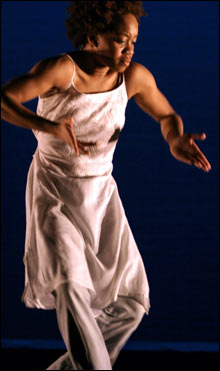
SNAP IN GRACE: Camille Brown still has it. |
“I will not move without Your consent,” swears the text at the heart of Ronald K. Brown’s 2005 work Order My Steps. Brown has paced that journey in almost all the work he has created over the past 20 years. As he searches to find a way to illustrate the toll and the triumph of spiritual struggle, both personal and communal, his best work faces the temptation of easy political answers and dance cliché and beats the Devil. Evidence, his contemporary company, performed in Boston last weekend under the auspices of World Music/CRASHarts. When the new Institute of Contemporary Art Barbara Lee Family Foundation Theater didn’t open on schedule, the engagement was transferred to the Cutler Majestic at Emerson. At the ICA, Evidence would have looked beautiful and taken its place amid other meaningful contemporary art, but in the Theater District the performances looked powerful and gritty. This program was a salient and timely reminder that the presenters in the new museum venue will have to make special efforts to preserve and extend access to a multicultural audience.
Brown’s downtown-Brooklyn style combines easy, even cocksure strides with West African polyrhythms: the choreography reads as ancestral culture breaking through the crust of urban life. A big loping entrance suddenly gives way to an angular break at the knees and turns into kneeling; lanky Juel Lane’s forward locomotion is arrested and flung backward by a hunch of his shoulder and by Chad Boseman’s text describing a junkie’s sensuous last date with his crackpipe.
In a work like Order My Steps or the signature Grace, which Brown created for Alvin Ailey’s American Dance Theater in 1999 and later reset on his own dancers, the carefully chosen music is part of the message. Whether the choice is Bob Marley’s jaunty reggae, the Kronos Quartet playing Terry Riley’s minimalist score, or Jennifer Holliday belting out Ellington to the schmaltzy accompaniment of a huge orchestra, Brown seems to prefer a steady motor or a smooth musical line he can syncopate and ornament. He’s not competing with the music, exactly; he seems to be complementing it by saying, “You go your way, friend, and I’ll go mine.”
All of this wouldn’t work if his dancers were not so strong, so precise, and so vividly committed to their own performances. Brown has assembled a diverse group of performers — neither carbon copies of him nor of one another — and it’s been wonderful to witness their artistic growth over the past few seasons.
In Walking Out the Dark, four dancers face off in a series of duets that are as frank and intimate as conversations overheard through hotel-room walls. Their reaches stop just short of touching one another and their backs twist in postures of resentment, disbelief, and despair. Brown manages to be both culturally specific — that West African language filtered into contemporary urban lives — and ungendered, so that the same movements read compellingly on the men and women as they dance out their different emotional truths.
The power of Walking Out the Dark this weekend depended on Bridget Moore’s inward focus, the sense that she has considered her options and only eventually comes to decisions to act, Tiffany Jackson’s ambivalence, with “Don’t mess with me” and “I can’t leave you” messages mingling in every angry pulse, Arcell Cabuag’s wiry and determined demands, and Brown himself, still strong and openly vulnerable as he approaches middle age. I was also moved by the snap of Camille Brown’s dancing in both Grace and Order My Steps. I’m sure she’s danced Grace hundreds of times by now, but when she exchanged her street-smart red dress for angelic white, it signaled a joyous transformation.